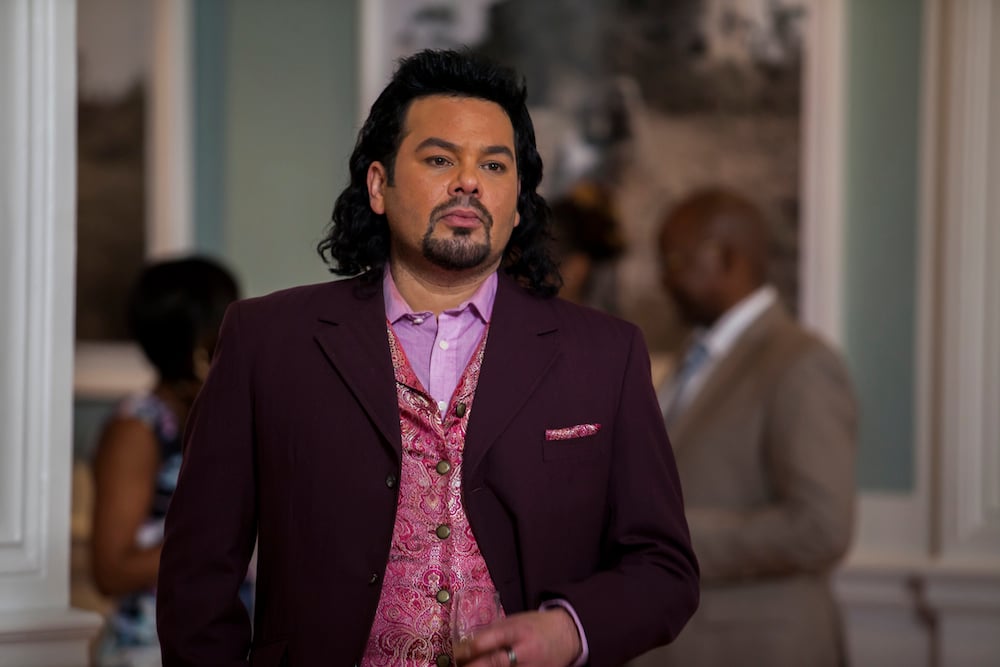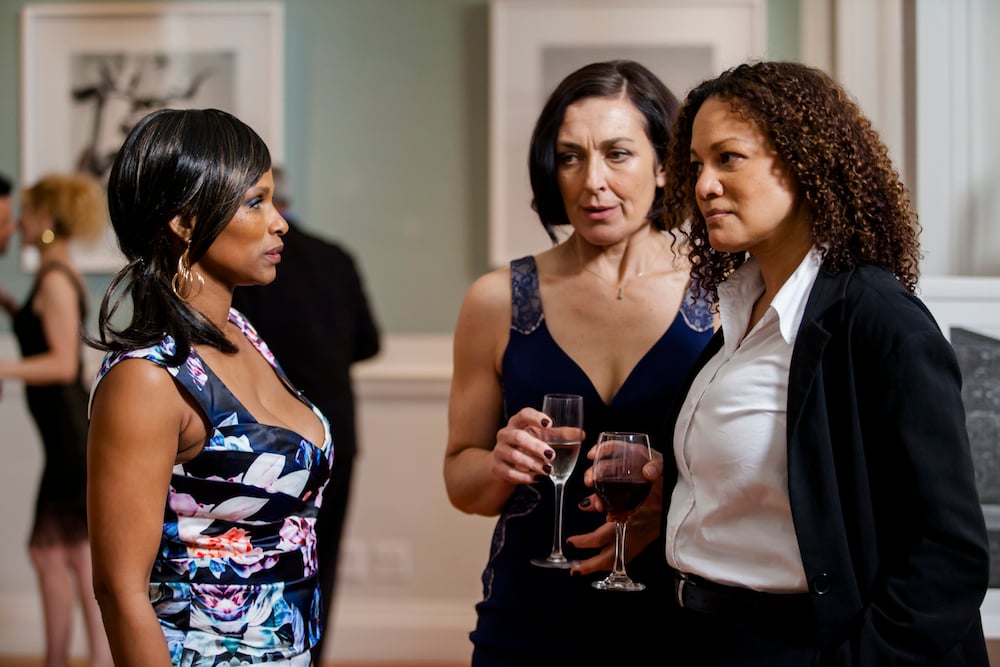Asanda
In the Cape Town-set film While You Weren’t Looking, an ageing gay man goes in a search of one of his former lovers, a former uMkhonto weSizwe (MK) operative who is now a political heavyweight. Meanwhile, his student Asanda, the adopted daughter of a well-to-do interracial lesbian couple, Dez and Terri, falls for Shado, a “tommy boy” from Khayelitsha, as her parents’ relationship falls apart.
Through these three parallel narratives, a compelling composite of contemporary South African LGBTI (lesbian, gay, bisexual, transgender and intersex) culture emerges, buoyed by immersive cinematography and an open approach to filmmaking.
The film, which was scripted, workshopped and shot in 18 months, was funded to the tune of about R8-million by the National Lotteries Commission and the Other Foundation, which funds arts initiatives with a connection to the LBGTI community.
“We were lucky that we got so much money without a script,” says producer Nodi Murphy, also the director of South Africa’s long-running gay and lesbian film festival, Out In Africa. “It was very soft money that we didn’t have to pay back.”
Murphy says many big film festivals have platforms where there are opportunities to look for funding for projects. “They have panels, and they bring in commissioning editors from big studios or independents, and people can pitch their ideas. But I don’t know of another film festival that raised the finance and actually produced a feature film.”
Makgano Mamabolo of Puo Pha Productions, who came in as an associate producer, says the film addressed a pivotal moment in South Africa, so “we couldn’t just tell a singular narrative about one person, because so much needed to be said, considering that this is the festival’s first and only [feature] movie. People brought their own short film ideas to the table. We then guided them in terms of how to make the narratives work for the cinema.”
The film was directed by Catherine Stewart and written by a team that included Matthew Krouse, Amy Jephta and Vanessa Herman. Krouse, who has handled several scriptwriting jobs, most notably the 1987 underground classic Shot Down, which he scripted with Andrew Worsdale, says early script-development workshops were overseen by Burhan Qurbani, the Afghan-German film director behind Shahada, a movie about three Muslim Berliners whose lives intersect as they confront fundamentalism and homosexuality.
Murphy says that, “when push came to shove and we had very little time, it seemed very appropriate to have the life experiences of the writers there”.

Terrence Bridget in his role as Tiny.
Krouse, who later took on the role of senior scriptwriter, emphasises the communal nature of the project. The movie, he says, “emerged from the consciousness of the group setting opposed to a visionary with a plan”.
Khathala Nkomo, who plays the part of Ntombi, the Khayelitsha tommy boy, agrees. She describes auditioning for her role as a “flexible process”.
“I was given two characters to audition for, and I could kind of choose my own story, so I had to pretend that I was talking to the other character.
“I was excited that it was a story based on the lives of lesbians in the township, but it wasn’t a typical homosexual movie where one [of them] would die because of who they are in love with, but you get into the surrounds of the township and get a sense of the [tensions surrounding the] friendships.”
Stewart says some of the actors in the tommy boy scenes are not actors. “They were consulting with us because [actress] Thishiwe Ziqubu and I didn’t know anything about that culture. So they just kept getting more and more of the lines.”
Elaborating on the personal genesis of one of the film’s narratives, Krouse says it emerged out of a liaison from his university days, back at the time of the repressive states of emergency. “These white guys who were involved in the anti-apartheid struggle said to me: ‘You are the only person not primarily involved on the underground circuit. Can you hide this guy in your bed, and when somebody knocks you can kind of say that he’s your boyfriend?’ And that’s what I did. I sheltered him for a short period of time.”
In the film, the ageing Mack, played by Lionel Newton, goes in pursuit of Joe (Fezile Mpela), a former MK operative he had helped in the days of the anti-apartheid struggle.
Krouse explains that the key question he sought to answer was, “if he [Joe] got into the groove of post-apartheid political success, would he be brave enough to own up to his constitutional rights, basically? To his right to say: ‘When I was in MK I had a gay relationship with a white man at a time when not only the ANC was illegal but when homosexuality was illegal and interracial sex was illegal.’ Now he has the right to say that. But public opinion hobbles way behind the Constitution.”
Krouse says a key consideration in the writing process was that “all those decisions [the characters] had to make came out of distinctly South African quandaries or dilemmas”.

Tina Jaxa, Camilla Waldman and Sandy Schultz in their respective roles as Milly, Terri and Dez.
There are several points at which the film moves into unabashed didacticism, be it in dinnertime conversations, in gloomy lecture halls, or in Khayelitsha’s dimly lit corners. At a function in Dez and Terri’s ample suburban home, guests bemoan being turned into “heteronormative citizens” by the Constitution. “We’re in the park with our two-year-olds,” says Dez. “It’s not marriage that makes us straight, it’s having children.”
In an art class, Mack discusses the labelling of activist-photographer Zanele Muholi’s photos of lesbian women as “pornographic” by Lulu Xingwana, then the minister of arts and culture, before gleefully asking: “What is the minister’s assumption about the nation?”
Asanda responds: “That the nation is heterosexual.”
For all its slick cinematography, its urgent pace and eclectic soundtrack, While You Weren’t Looking is not a story without its blind spots. As the power dynamics of race are not squarely addressed, the way some of the class tensions are explored in the film leads to a one-dimensionally represented underclass.
The thugs of Khayelitsha are always scowling, impulsively bent on blood, while the tommy boys overcompensate accordingly. The difficulty the filmmakers must have had in weaving some of the narrative strands together is sometimes apparent. Some of the storylines are left hanging.
Stewart says fitting the characters into position was structurally easy, “but then to think about how to adjust their climaxes and their themes and resonances so that they work together and seem to speak to each other – it was quite complex. So it was great that the writers trusted us in that workshop process.”
Co-writer Jephta says she believes a fair balance was achieved, resulting in an attention-grabbing film. “I think this created a very absorbing film, where I definitely think all the separate storytelling strands were done justice to. I think this kind of narrative relies on the audience to choose its protagonist – to pick the person you most identify with in the story, and then watch the film through that lens.”